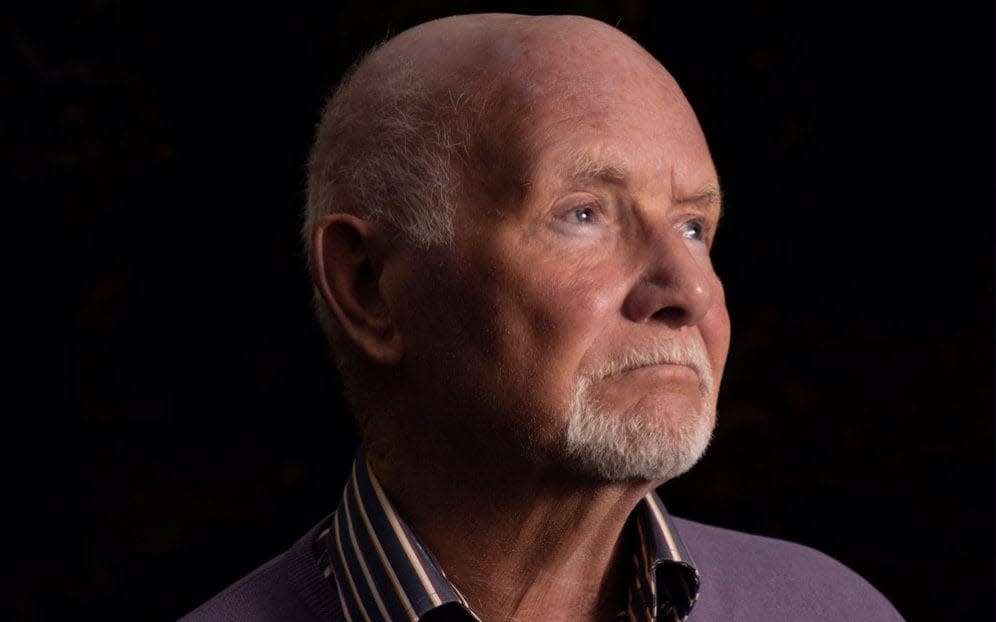'Heavy traffic' and loss of hard shoulder blamed for 'delays' in reaching smart motorways victim

- Oops!Something went wrong.Please try again later.
Scrapping the hard shoulder causes mayhem for emergency services trying to reach motorists injured on smart motorways, Highways England files obtained by the Telegraph reveal.
A log of communications from the Government-owned company shows its staff had to offer to “hand stop” traffic and even divert ambulances the wrong way down a carriageway to reach a motorist dying after being stranded in a live lane after a breakdown.
The dossier, obtained under the Freedom of Information Act, shows for the first time the difficulties created by turning the hard shoulder into a fourth lane and removing easy access to crash scenes.
The files document attempts to reach Derek Jacobs, 83, who was killed after being hit as he tried to repair his van after failing to reach an emergency refuge area on the M1 in March 2019. Charles Scripps, 78, was a passenger in a car involved in the accident and died seven weeks later in hospital.
Transcripts of electronic communications reveal how Highways England failed to close a carriageway despite repeated “urgent” requests to allow an air ambulance to land, forcing helicopter paramedics to put down in a field near the motorway.
And, in the hours after the crash there were repeated reports of “heavy traffic”, potentially thwarting police, fire and ambulance efforts to get to the scene.
Mr Jacobs’ widow, Sally, 83, last night rounded on Highways England bosses and the Department for Transport for the continued roll out of smart motorways, claiming her husband would be alive today if there had been a hard shoulder.
“It is remarkable that they eventually had to stop the traffic from the opposite direction to bring emergency services the wrong way down the motorway to reach my husband,” Mrs Jacobs, from North London, said.
“If you kill someone accidentally it’s manslaughter. But they know what is happening, so deaths on smart motorways should now be viewed as murder. They won’t listen. I can’t bring my beloved Derek back, but I can try to stop this happening to other people.”
The crash was reported shortly before 1pm after Highways England failed to spot Mr Jacobs trapped on the inside lane and close the carriageway to traffic.
Despite appeals to “please close road in both directions” and “urgent” calls for “units to assist” the air ambulance due to “cardiac arrest patient”, the helicopter “landed on [a] field adjacent” to the motorway. The crew was allowed to “reverse access” on the southbound carriageway.
Three patients were taken to Sheffield Northern General Hospital by ambulance. The ambulance service received the 999 call at 12.52pm with the first paramedic arriving 24 minutes later. Mr Jacobs was confirmed dead at the scene an hour after the crash.
The log reveals how Highways England staff who would normally travel up the hard shoulder to the scene of a crash on a traditional motorway encountered severe difficulties in the four lanes of “trapped traffic”.
One patrolman reports that he is “stuck in traffic - any other way we can get to this?”. Another simply says “completely stuck in traffic” with another warning “solid traffic up until junction 30”.
The log records one member of staff on the M1 saying: “Can hand stop the traffic on the main carriageway.”
Highways England refused to say whether there was a fault with their signalling system which is meant to show red Xs barring traffic from some or all lanes.
A spokesman for the company said: “Our sympathies remain with the families and friends of Mr Jacobs and Mr Scripps.
“We worked closely with the emergency services as part of a multi-agency response into the tragic and complex incident which took place on 22 March 2019.
“As there is an ongoing police investigation it would be inappropriate to comment further on the detail.”
A spokeswoman for East Midlands Ambulance Service said: “Our frontline staff are trained to deal with all road conditions, whether that is while driving normally or under blue light conditions, and we continue to work closely with Highways England to ensure we can use restricted access routes along the M1 when responding to emergencies.”

